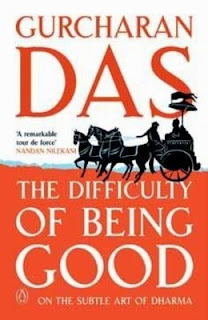Book
Review
Title:
The Difficulty of Being Good
Author:
Gurcharan Das
Publisher:
Penguin India, 2012
The
Mahabharata is an epic that can be interpreted in numerous ways. As Gurcharan Das says, “It is a cosmic
allegory of the eternal struggle between good and evil on one plane. At another level, it is about an
all-too-human fight between the cousins of a royal family, which leads to a war
and ends tragically in the death of almost everyone. At a third level – and this is primarily the
subject of my book – it is about the crisis of conscience of some of its
characters.”
Das
spent six years studying the epic, having taken an “academic holiday” from his
successful career as a writer. Before
turning to fulltime writing, Das worked with multinational companies. The prevalence of evil in the world of human
beings set Das on a kind of spiritual quest.
The Difficulty of Being Good
was the outcome.
The
book is an intellectual, spiritual, moral, philosophical and psychological
exploration of one of India’s greatest epics.
It deserves to be read by anyone who wishes to understand the
Mahabharata from a very wide perspective.
Anyone who is put off by the burgeoning darkness of evil in the world
should read this book.
It
does not provide any solution to the problem of evil. There isn’t any solution. But we can learn how to deal with evil and
keep ourselves good. Quoting Machiavelli
Das says, “a man who wishes to profess goodness at all times will come to ruin
among so many who are not so good.” When
the patriarch Bhishma said that dharma was subtle, he meant little else.
The
Mahabharata shows how difficult it is to be good in a world of ‘bad’
people. Yudhishthira tried his best to
cling on to what he perceived as his dharma but failed to avoid the war and all
the killings. Yudhishthira’s dharma was
based on benevolence, compassion and generosity. Krishna, an avatar of God Vishnu himself,
used many devious strategies and deceptions in order to defeat the
Kauravas. Even God would find it
difficult to be good in the world of human affairs.
What
is our duty then? That’s what Das’s book
tries to answer. It succeeds in
providing a convincing answer too. It is
worth reading the book whether one is religious or not. The insights provided in the book are not
based on any particular religion. Das
brings in a whole spectrum of knowledge ranging from classic literature to
contemporary economic views, from philosophy to psychology. The best thing about it is its lucidity in
spite of the profundity.
The
books shows how religious literature should be read and interpreted. That one reason alone should be enough for
one to read it.


From your review, it seems that it is a must read for me. Thanks for sharing.
ReplyDeleteWell... as far as I understand Mahabharata, there isn't any distinguish between good and bad, Both are miseries in context of human beings. It deals with Transcendence - Rising beyond Good & Bad.
It is the transcendence that Das is driving at, Ravish. You will love the book for that reason. But transcendence has to be pragmatic too for the ordinary mortals. And Das manages to be practical. The reason is that he was on a genuine quest. That's why I recommend the book.
Delete